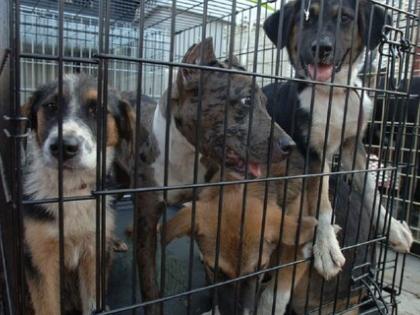South Korea Bans Dog Meat Trade: Parliament Unanimously Passes Historic Bill
By Lokmat English Desk | Updated: January 9, 2024 12:37 IST2024-01-09T12:36:55+5:302024-01-09T12:37:59+5:30
South Korea's parliament has finally taken a decisive step towards ending the controversial practice of dog meat consumption by ...

South Korea Bans Dog Meat Trade: Parliament Unanimously Passes Historic Bill
South Korea's parliament has finally taken a decisive step towards ending the controversial practice of dog meat consumption by passing a bill on Tuesday. This historic move outlaws the centuries-old trade, reflecting the growing public sentiment for animal welfare and the changing role of dogs in Korean society.
While dog meat was once seen as a seasonal delicacy, particularly during the hot and humid Korean summers, its consumption has dwindled in recent decades. The practice is now mainly confined to older generations, and a younger generation raised on companion animals increasingly views dog meat with a mix of aversion and disapproval.
Concerns over the often brutal methods of slaughter, with methods like electrocution and hanging being employed, have further fueled public opposition to the trade. However, dog breeders and traders have argued for progress in implementing more humane practices.
The tide began to turn significantly under President Yoon Suk-yeol, a self-proclaimed animal lover. His family's adoption of six dogs and eight cats, along with First Lady Kim Keon-hee's vocal criticism of dog meat consumption, contributed to the growing momentum for change.
The bill, proposed by the ruling People Power Party, received overwhelming support in parliament, passing with 208 votes in favor and only two abstentions. This follows its approval by the bipartisan agriculture committee on Monday.
The legislation will come into effect after a three-year grace period, allowing for a smooth transition and potential support for affected businesses. Violators of the ban face hefty penalties, including up to three years in prison or fines of 30 million Korean won (approximately $22,800).
"This bill marks a pivotal moment in ending the suffering of millions of dogs," stated Borami Seo of Humane Society International Korea, an animal protection group. "It's a significant victory for animal welfare and a testament to the evolving values of Korean society."
The passing of the dog meat trade ban signifies a major step forward for animal rights in South Korea. It aligns the country with a growing global movement against the practice and sets a positive example for other nations where dog meat consumption persists. The road ahead may involve navigating logistical challenges and addressing the concerns of affected individuals, but the ultimate goal of a more humane and compassionate future for dogs in South Korea seems closer than ever.
Open in app